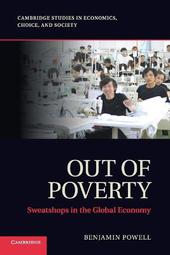
|
Out of Poverty: Sweatshops in the Global Economy
Paperback / softback
Main Details
| Title |
Out of Poverty: Sweatshops in the Global Economy
|
| Authors and Contributors |
By (author) Benjamin Powell
|
| Series | Cambridge Studies in Economics, Choice, and Society |
|---|
| Physical Properties |
| Format:Paperback / softback | | Pages:198 | | Dimensions(mm): Height 231,Width 155 |
|
| Category/Genre | Labour economics
Development economics |
|---|
| ISBN/Barcode |
9781107688933
|
| Classifications | Dewey:338.90091724 |
|---|
| Audience | | Professional & Vocational | |
|---|
| Illustrations |
6 Tables, unspecified; 1 Halftones, unspecified; 8 Line drawings, unspecified
|
|
Publishing Details |
| Publisher |
Cambridge University Press
|
| Imprint |
Cambridge University Press
|
| Publication Date |
10 March 2014 |
| Publication Country |
United Kingdom
|
Description
This book provides a comprehensive defense of third-world sweatshops. It explains how these sweatshops provide the best available opportunity to workers and how they play an important role in the process of development that eventually leads to better wages and working conditions. Using economic theory, the author argues that much of what the anti-sweatshop movement has agitated for would actually harm the very workers they intend to help by creating less desirable alternatives and undermining the process of development. Nowhere does this book put 'profits' or 'economic efficiency' above people. Improving the welfare of poorer citizens of third world countries is the goal, and the book explores which methods best achieve that goal. Out of Poverty will help readers understand how activists and policy makers can help third world workers.
Author Biography
Benjamin Powell is the Director of the Free Market Institute at Texas Tech University and a Visiting Professor in the Rawls College of Business. He is a Past President of the Association of Private Enterprise Education and a Senior Fellow with the Independent Institute. Professor Powell is editor of Making Poor Nations Rich: Entrepreneurship and the Process of Development (2008) and co-editor of Housing America: Building Out of a Crisis (2009). He is author of more than 50 scholarly articles and policy studies. His primary fields of research are economic development, Austrian economics, and public choice. Dr Powell's scholarly research on sweatshops has been published in Comparative Economic Studies, the Journal of Labor Research, Human Rights Quarterly, and the Journal of Business Ethics. His research findings have been reported in more than 100 popular press outlets including the Wall Street Journal and the New York Times. He received his PhD in economics from George Mason University.
Reviews'This eloquent book makes the compassionate case for sweatshops in poor countries as what poor workers voluntarily select as employers because they are better than the alternatives. It is uncommonly clear in this book that the economists' case for sweatshops is based on what's best for the workers, not what's best for efficiency or profits or First World consumers.' William Easterly, Co-Director, Development Research Institute, New York University, and author of The White Man's Burden and The Elusive Quest for Growth 'Ben Powell has written a brilliant and thought-provoking book on sweatshops. He challenges a number of critical beliefs about them which, although springing from concern about the poor, lead to policies that will harm the poor. No policymakers, especially in aid and development agencies like USAID and UNDP, can afford to ignore this masterly book.' Jagdish Bhagwati, Columbia University, and author of In Defense of Globalization 'The term 'sweatshops' is a dirty word to students on American campuses and activists around the world, implying exploited workers toiling in horrible conditions for long hours at low pay. Powell's splendid new book gives us another perspective: how workers view sweatshops as an opportunity for improving their economic condition. Indeed, countless Americans, Japanese, and others enjoy their high standard of today living because their grandmothers and grandfathers worked in sweatshops a century ago.' Douglas Irwin, Dartmouth College, and author of Free Trade Under Fire
|